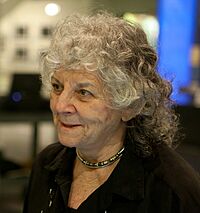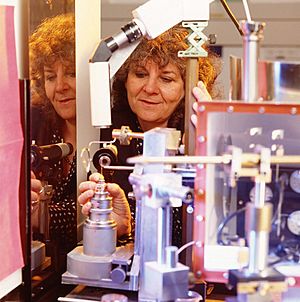Ada Yonath facts for kids
Quick facts for kids
Ada E. Yonath
|
|
|---|---|
| עדה יונת | |

Yonath in 2013
|
|
| Born |
Ada Lifshitz
22 June 1939 |
| Citizenship | Israeli |
| Education | |
| Known for | Cryo bio-crystallography |
| Awards | Harvey Prize (2002) Wolf Prize in Chemistry (2006) L'Oréal-UNESCO Award for Women in Science (2008) Albert Einstein World Award of Science (2008) Nobel Prize in Chemistry (2009) |
| Scientific career | |
| Fields | Crystallography |
| Institutions | Weizmann Institute of Science University of Chicago |
| Doctoral advisor | Wolfie Traub, F. Albert Cotton |
Ada E. Yonath is a famous Israeli scientist. She is a crystallographer, which means she studies the structure of crystals. She won the Nobel Prize in Chemistry in 2009.
Ada Yonath is best known for her amazing work on ribosomes. Ribosomes are like tiny factories inside our cells. They build all the proteins our bodies need to work. Her discoveries helped us understand how these tiny factories work. She was the first Israeli woman to win a Nobel Prize. She was also the first woman from the Middle East to win a Nobel Prize in science.
Contents
Ada Yonath's Early Life and Education
Ada Lifshitz, later known as Ada Yonath, was born in Jerusalem on June 22, 1939. Her parents, Hillel and Esther Lifshitz, moved to what is now Israel from Poland in 1933. Her father was a rabbi.
The family was not rich. They lived in a small space with other families. Ada remembers that books were her main source of entertainment. Even though they had little money, her parents sent her to a good school. They wanted her to get a great education.
When her father passed away at age 42, her family moved to Tel Aviv. Ada was accepted into Tichon Hadash high school. Her mother could not pay the school fees. So, Ada gave math lessons to other students to help pay for her own studies.
Ada Yonath's University Studies
Ada Yonath returned to Jerusalem for college. She studied at the Hebrew University of Jerusalem. She earned a bachelor's degree in chemistry in 1962. Then, she got a master's degree in biochemistry in 1964.
In 1968, she earned her PhD from the Weizmann Institute of Science. Her PhD research focused on the structure of collagen. She used a method called X-ray crystallography for her studies.
Ada Yonath has one daughter, Hagit Yonath, who is a doctor. She also has a granddaughter named Noa.
Ada Yonath's Scientific Discoveries

After her PhD, Ada Yonath worked at Carnegie Mellon University and MIT. At MIT, she was inspired to study very large structures in cells.
In 1970, she started the first protein crystallography lab in Israel. For almost ten years, it was the only one. She also worked at the Max Planck Institute for Molecular Genetics in Berlin. She was a visiting professor at the University of Chicago.
Understanding Ribosomes
Ada Yonath focused on how proteins are made inside cells. This process happens in ribosomes. She was a pioneer in studying ribosomes using crystallography. Many scientists were doubtful at first. Ribosomes are very complex structures.
In 2000 and 2001, she figured out the full, detailed structures of both parts of the ribosome. She found a special symmetrical area inside the ribosome. This area helps guide the process of making proteins. She showed that the ribosome itself helps make the chemical bonds for proteins.
Ribosomes and Antibiotics
Ada Yonath also studied how different antibiotics work. Antibiotics are medicines that fight infections. Many antibiotics work by targeting ribosomes in bacteria. Bacterial ribosomes are slightly different from human ribosomes. This difference allows antibiotics to kill bacteria without harming human cells.
Her research helped explain how antibiotics stop bacteria from making proteins. She also showed why some bacteria become resistant to antibiotics. Her work has been very important for developing new medicines. It helps scientists design better antibiotics.
Cryo Bio-crystallography
To study ribosomes, Ada Yonath developed a new method. It is called cryo bio-crystallography. This technique involves freezing biological samples. Freezing helps keep the delicate structures stable. This method is now used by many scientists. It allows them to study very tiny and complex biological structures.
Ada Yonath's Views on Peace
Ada Yonath has spoken about her views on peace. She has called for the release of all Palestinian prisoners. She believes that holding prisoners can encourage more conflict. She thinks that if there are no prisoners to release, there would be less reason for kidnappings.
Awards and Honors
Ada Yonath has received many important awards for her scientific work. She is a member of several top science academies. These include the United States National Academy of Sciences. In 2014, Pope Francis made her a member of the Pontifical Academy of Sciences.
Some of her major awards include:
- 2002: Israel Prize
- 2002: Harvey Prize
- 2006: Wolf Prize in Chemistry
- 2008: Albert Einstein World Award of Science
- 2009: Nobel Prize in Chemistry (shared with Thomas Steitz and Venkatraman Ramakrishnan)
- 2011: Marie Curie Medal
She has also received honorary doctorates from many universities around the world. These include the University of Southern California and Carnegie Mellon University. In 2020, she became a Foreign Member of the Royal Society.
See also
- Women of Israel
- History of RNA biology
- List of Israel Prize recipients
- List of female Nobel laureates
- List of Israeli Nobel laureates
- List of Jewish Nobel laureates
- List of peace activists
- List of RNA biologists
- Timeline of women in science
- Women in chemistry

